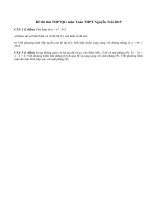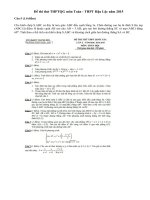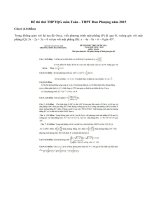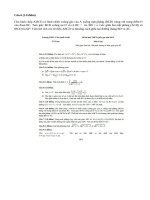- Trang chủ >>
- Đề thi >>
- Đề thi tuyển dụng
De thi thu THPTQG mon Anh THPT TD
Bạn đang xem bản rút gọn của tài liệu. Xem và tải ngay bản đầy đủ của tài liệu tại đây (132.43 KB, 6 trang )
TRƯỜNG THPT THỦ ĐỨC
Năm học 2017-2018
ĐỀ THI THỬ THPTQG
Môn : ANH – Thời gian : 60 phút
MÃ ĐỀ
CH01
Họ tên học sinh:……………………………….……… Lớp:…………… Số báo danh: ………………
Read the following passage and mark the letter A, B, C, or D on your answer sheet to indicate the
correct word or phrase that best fits each of the numbered blanks from 1 to 5.
Vietnamese information technology leader FPT looks to turn Danang into a "smart city"
(1)______two years, focusing on fields such as agriculture, medicine, energy and traffic.
The company plans to spend $658,000 on pilot (2)______in the country's third-largest metropolis
over the next year, aiming to begin smart city operations in 2020. FPT and the city of Danang signed a
memorandum of understanding Thursday.
FPT will work to prevent traffic jams on Danang's streets through real-time monitoring of roads and
management of traffic signals. The company also plans to introduce an electronic patient record system
for hospitals as well as a crop management tool for farmers. Technology would be used in (3)______to
natural disasters such as tsunamis and floods as well.
In 2016, the company opened an IT hub in Danang, (4)______it employs 10,000 engineers. Danang
offers cheaper labor costs than Hanoi or Ho Chi Minh City, and its abundance of science and engineering
schools helps FPT secure talent. The city's potential as a tech hub continues to grow as companies from
Japan, Europe and the U.S. start to gather.
Plans to create smart cities are underway in other parts of Vietnam. Hanoi, (5)______, is slated to
become a smart city by 2023 with help from a public-private partnership between Japan's trade ministry
and companies such as Sumitomo Corp. and Mitsubishi Heavy Industries. Ho Chi Minh City has teamed
with the real estate arm of Singaporean conglomerate Keppel to develop smart technologies.
( />1:
A. during
B. for
C. in
D. at
2:
A. conceptions
B. projects
C. feats
D. syllabus
3:
A. retaliating
B. replying
C. responding
D. hitting back
4:
A. why
B. which
C. where
D. who
5:
A. however
B. now that
C. thus
D. for instance
Mark the letter A, B, C, or D on your answer sheet to indicate the word(s) CLOSEST in meaning to the
underlined word(s) in each of the following questions.
6: Perhaps we do now need a strong, charismatic and inspiring leader to help it make sense of all the
uncertainty and seize the opportunity to make a statement of identity.
A. monotonous
B. appalling
C. appealing
D. distasteful
7: The economic crisis initiated renovation policies of the late 1980s.
A. made way for
B. gave rise to
C. did harm to
D. set fire to
Mark the letter A, B, C, or D on your answer sheet to show the underlined part that needs
correction in each of the following questions.
8: Big loans on very favourite conditions are offered by the bank to those who make a large-scale investment.
A
B
C
D
9: Alice is working really hard on her business skills as she wants to make a good manageress.
A
B
C
D
10: However unfavorable is our position, we must put a bold face on it.
A
B
C
D
Mark the letter A, B, C, or D on your answer sheet to indicate the word whose underlined part
differs from the other three in pronunciation in each of the following questions.
11: A. burial
B. include
C. improve
D. couture
12:
A. mouths
B. baths
C. paths
D. months
Mark the letter A, B, C, or D on your answer sheet to indicate the correct answer to each of the
following questions.
13: The combination of visual and auditory ________ is intriguing as well for the audience.
A. encouragements
B. motivations
C. stimuli
D. inspirations
14: If we had been being more considerate in using our natural resources, we ________ so worried now
about the fact that our next generation will be lacking in energy.
A. wouldn’t be
B. wouldn’t have been C. won’t be
D. weren’t
15: Up _____ when it saw its master.
A. jumped the dog
B. did the dog jump
C. the dog jumped
D. does the dog jump
16: He likes seeing and talking to her, but he can't stand (see) _____ her (talk)_______ with other men.
A. see – talk
B. seeing – talking
C. seeing – talks
D. to see – to talk
17: He ordered us back to work before we ________ our meal. Then I fed a dog with the leftovers.
A. ate
B. were eating
C. had eaten
D. would eat
18: William borrowed Grandpa's old suit ________ neatly on a hanger to wear to the interview.
A. draped
B. draping
C. which draped
D. being draping
19: The teacher’s comments ________ to me that my son is in serious trouble at school.
A. illustrate
B. indicate
C. mean
D. show
20: It may be that boys find it difficult being with a girl who's ________ ahead.
A. proceeding
B. promoting
C. accelerating
D. forging
21: I am your ________ teacher, who definitely expect great things and nothing but success of my
students.
A. narrow-minded
B. highly-respected
C. strong-willed
D. quick-witted
22: Some candidates failed the oral examination because they didn’t have enough ________.
A. confidence
B. confide
C. confidential
D. confident
23: How can I know who stained the carpet! Mary ________ that, who knows.
A. may have done
B. must have done
C. might do
D. could do
24: I wish to see the personnel manager, ________?
A. will I
B. do I
C. may I
D. can I
Mark the letter A, B, C, or D on your answer sheet to indicate the most suitable sentence to
complete each of the following exchanges.
25: Pat: "Being polite is hard work."
Kathy: "______. Behaving well is never easy. But to get along, we must learn some basic dos and
don'ts."
A. You too
B. What’s next?
C. You’ve gained my heart D. I’m with you
there
26: Maria: "Do you feel like seeing the film?"
Diana: "Sure. ______"
A. The soundtrack was amazing.
B. Whom does it star?
C. What film is it?
D. It is my hobby.
Mark the letter A, B, C, or D on your answer sheet to indicate the sentence that is closest in meaning to
each of the following questions.
27: The kids’ having left home leaves us a lot of spare room.
A. The kids left home to make room for us.
B. We’ve got a room because the kids have left home.
C. So long as the kids left home, we would have a lot of spare room.
D. Now that the kids have left home, we've got a lot of extra space.
28: Mr. Thompson's opinion of these innovations is rather low.
A. Mr. Thompson does not think much of these innovations.
B. Mr. Thompson objects to these innovations.
C. Mr. Thompson cannot make out these innovations.
D. Mr. Thompson’s knowledge of these innovations is poor.
29: “There is a big hole on the road ahead, Sam,” she said.
A. She suggested avoiding the hole on the road ahead.
B. She advised Sam to take notice of the road.
C. She warned Sam about a big hole on the road ahead.
D. She paid attention to the hole on the road ahead.
Mark the letter A, B, C, or D on your answer sheet to indicate the word that differs from the other
three in the position of primary stress in each of the following questions.
30: A. picturesque
B. agriculture
C. astronautics
D. internecine
31: A. coincident
B. ignorant
C. stimulus
D. impotent
Mark the letter A, B, C, or D on your answer sheet to indicate the sentence that best combines each
pair of sentences in the following questions.
32: He searched high and low for the will. He knew that his father put it somewhere in the room.
A. Much though he knew that his father put the will somewhere in the room, he did not search for
it.
B. Knowing that his father put the will somewhere in the room, he searched high and low for it.
C. Had he known that his father put the will somewhere in the room, he would search for it.
D. Only when he knew his father put the will somewhere in the room did he search for it.
33: They haven't invited either Mr. Hornby or his wife to the barbecue.
A. Not only Mr. Hornby but his wife has also been invited to the barbecue.
B. Either Mr. Hornby or his wife has been invited to the barbecue.
C. Not only have they invited Mr. Hornby to the barbecue, they have invited his wife as well.
D. Neither Mr. Hornby nor his wife has been invited to the barbecue.
Read the following passage and mark the letter A, B, C, or D on your answer sheet to indicate the
correct answer to each of the questions from 34 to 40.
Baseball evolved from a number of different ball-and-stick games (paddleball, trap ball, one-oldcat, rounders, and town ball) originating in England. As early as the American Revolution, it was noted
that troops played “base ball” in their free time. In 1845, Alexander Cartwright formalized the New York
Knickerbockers’ version of the game: a diamond shaped infield, with bases ninety feet apart, three
strikes-you’re-out, batter out on a caught ball, three outs per inning, a nine-man team. The “New York
Game” spread rapidly, replacing earlier localized forms. From its beginnings, baseball was seen as a way
of satisfying the recreational needs of an increasingly urban-industrial society. At its inception it was
played by and for wealthy gentlemen. A club might consist of 40 members. The president would appoint
two captains who would choose teams from among the members. Games were played on Monday and
Thursday afternoons, with the losers often providing a lavish evening’s entertainment for the winners.
During the 1850-70 period, the game was changing, however, with increasing commercialism
(charging admission), under-the-table payments to exceptional players, and gambling on the outcome of
games. By 1868, it was said that a club would have their regular professional ten, an amateur first-nine,
and their “muffins” (the gentlemanly duffers who once ran the game). Beginning with the first openly allsalaried team (Cincinnati’s Red Stocking Club) in 1869, the 1870-1890 period saw the complete
professionalization of baseball, including formation of the National Association of Professional Baseball
Players in 1871. The National League of Professional Base Ball Clubs was formed in 1876, run by
business-minded investors in joint-stock company clubs. The 1880s has been called Major League
Baseball’s “Golden Age”. Profits soared, player’s salaries rose somewhat, a season of 84 games became
one of 132, a weekly periodical “The Sporting News” came into being, wooden stadiums with doubledeck stands replaced open fields, and the standard refreshment became hot dogs, soda pop and peanuts. In
1900, the Western League based in the growing cities of the Midwest proclaimed itself the American
League.
34: What is the passage mainly about?
A. The influence of the “New York Game” on baseball
B. The development of baseball in the nineteenth century
C. The commercialization of baseball
D. The origins of baseball
35: Which of the following can be inferred from the passage?
A. Business-minded investors were only interested in profits
B. The “New York Game” spread rapidly because it was better formalized
C. Hot dogs would not have become as popular as they did, without the professionalism and
commercialism that developed in baseball
D. The wealthy gentlemen who first played baseball, later needed to find another recreational
opportunity if they did not want to mix with others or become a “muffin”
36: The word “inception” in 1st paragraph, line 7 is closest in meaning to ________.
A. beginning
B. requirements
C. rules
D. insistence
37: The word “lavish” in 1st paragraph, line 10 is closest in meaning to ________.
A. grand
B. extensive
C. prolonged
D. very generous
38: Which of the following is true of the way the game was played by wealthy gentlemen at its
inception?
A. They might be called “duffers” if they didn’t make the first nine.
B. They didn’t play on weekends.
C. A team might consist of 40 members.
D. The president would choose teams from among the members.
39: According to the second paragraph, all of the following are true except ________ .
A. people gamed on the outcome of games
B. commercialism became more prosperous
C. outstanding players got extra income
D. the clubs are smaller
40: Which of the following is NOT mentioned as a feature of the 1880s “Golden Age”?
A. The National Association of Professional Baseball Players was formed.
B. Wooden stadiums replaced open fields.
C. A weekly periodical commenced
D. Profits soared
Mark the letter A, B, C, or D on your answer sheet to indicate the word(s) OPPOSITE in meaning to
the underlined word(s) in each of the following questions.
41: It's more of the same only faster and faster because the future's now coming at the speed of light and
change is accelerating at an exponential rate.
A. at lightning speed
B. speedily
C. rapidly
D. stagnantly
42: I’m going to have to take the day off work. I feel quite under the weather today.
A. fine
B. ill
C. sad
D. sick
Read the following passage and mark the letter A, B, C, or D on your answer sheet to indicate the
correct answer to each of the questions from 43 to 50.
For 150 years scientists have tried to determine the solar constant, the amount of solar energy that
reaches the Earth. Yet, even in the most cloud-free regions of the planet, the solar constant cannot be
measured precisely. Gas molecules and dust particles in the atmosphere absorb and scatter sunlight and
prevent some wavelengths of the light from ever reaching the ground.
With the advent of satellites, however, scientists have finally been able to measure the Sun's output
without being impeded by the Earth's atmosphere. Solar Max, a satellite from the National Aeronautics
and Space Administration (NASA), has been measuring the Sun's output since February 1980. Although a
malfunction in the satellite's control system limited its observation for a few years, the satellite was
repaired in orbit by astronauts from the space shuttle in 1984. Max's observations indicate that the solar
constant is not really constant after all.
The satellite's instruments have detected frequent, small variations in the Sun's energy output,
generally amounting to no more than 0.05 percent of the Sun's mean energy output and lasting from a few
days to a few weeks. Scientists believe these fluctuations coincide with the appearance and disappearance
of large groups of sunspots on the Sun's disk. Sunspots are relatively dark regions on the Sun's surface
that have strong magnetic fields and a temperature about 2,000 degrees Fahrenheit cooler than the rest of
the Sun's surface. Particularly large fluctuations in the solar constant have coincided with sightings of
large sunspot groups. In 1980, for example, Solar Max's instruments registered a 0.3 percent drop in the
solar energy reaching the Earth. At that time a sunspot group covered about 0.6 percent of the solar disk,
an area 20 times larger than the Earth's surface.
Long-term variations in the solar constant are more difficult to determine. Although Solar Max's
data have indicated a slow and steady decline in the Sun's output, some scientists have thought that the
satellite's aging detectors might have become less sensitive over the years, thus falsely indicating a drop
in the solar constant. This possibility was dismissed, however, by comparing Solar Max's observations
with data from a similar instrument operating on NASA's Nimbus 7 weather satellite since 1978.
43: What does this passage mainly discuss?
A. The interaction of sunlight and air pollution
B. The launching of a weather satellite
C. The measurement of variations in the solar constant
D. The components of the Earth's atmosphere
44: Why does the author mention "gas" and "dust" in line 3?
A. They interfere with accurate measurement of the solar constant.
B. They are found in varying concentrations.
C. Scientific equipment is ruined by gas and dust.
D. They magnify the solar constant.
45: Why is it not possible to measure the solar constant accurately without a satellite?
A. The Earth's atmosphere interferes with the sunlight.
B. Some areas on Earth receive more solar energy than others.
C. There is not enough sunlight during the day.
D. The Earth is too far from the Sun.
46: The word "its" in line 8 refers to the ________.
A. malfunction
B. orbit
C. atmosphere
D. satellite
47: According to the passage, scientists believe variations in the solar constant are related to ________.
A. increased levels of dust
B. unusual weather patterns
C. fluctuations in the Earth's temperature
D. sunspot activity
48: Why did scientists think that Solar Max might be giving unreliable information?
A. Nimbus 7 interfered with Solar Max's detectors.
B. The space shuttle could not fix Solar Max's instruments.
C. Solar Max did not work for the first few years.
D. Solar Max's instruments were getting old.
49: The phrase "This possibility" in line 23 refers to the likelihood that the ________.
A. Nimbus 7 satellite is older than Solar Max
B. solar constant cannot be measured
C. solar constant has declined
D. instruments are providing inaccurate data
50: The attempt to describe the solar constant can best be described as ________.
A. an issue that has been resolved
B. a question that can never be answered
C. historically interesting, but irrelevant to contemporary concerns
D. an ongoing research effort
-THE END-
Ðáp án :
1. C
8. B
15. B
22. A
29. C
36. A
43. C
50. D
2. B
9. A
16. B
23. A
30. B
37. D
44. A
3. C
10. B
17. C
24. C
31. A
38. B
45. A
4. C
11. A
18. A
25. D
32. B
39. C
46. D
5. D
12. D
19. B
26. B
33. D
40. A
47. D
6. C
13. C
20. D
27. D
34. B
41. D
48. D
7. B
14. A
21. C
28. A
35. B
42. A
49. D









